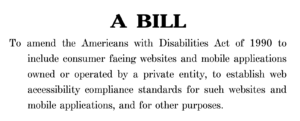 Richard was interviewed this week by Kris Rivenburgh on his ADA Book YouTube channel and podcast, which is now streaming at https://www.youtube.com/watch?v=rMwsgy57kC4 and all your major podcast sources. The interview covers the latest legal developments as well as prospects for future regulation and litigation. Businesses concerned with ADA website compliance might want to check out Kris’s ADA Compliance course at https://adacompliance.net.
Richard was interviewed this week by Kris Rivenburgh on his ADA Book YouTube channel and podcast, which is now streaming at https://www.youtube.com/watch?v=rMwsgy57kC4 and all your major podcast sources. The interview covers the latest legal developments as well as prospects for future regulation and litigation. Businesses concerned with ADA website compliance might want to check out Kris’s ADA Compliance course at https://adacompliance.net.


 If foolishness were limited to one day a year this blog would be well overdue, but a glance at the news – legal, political or other, shows that every day in April can be April fools day, so I make no apologies for the delay in getting this out.
If foolishness were limited to one day a year this blog would be well overdue, but a glance at the news – legal, political or other, shows that every day in April can be April fools day, so I make no apologies for the delay in getting this out. On October 2, while the news covered President Trump’s admission to Walter Reed for treatment of Covid-19, Congressmen Lou Correa (D-CA) and Ted Budd (R-NC) introduced the bipartisan Online Accessibility Act, which they claim will “increase website accessibility and reduce predatory lawsuits filed against businesses.”¹ Will it work? That’s a reasonable question.
On October 2, while the news covered President Trump’s admission to Walter Reed for treatment of Covid-19, Congressmen Lou Correa (D-CA) and Ted Budd (R-NC) introduced the bipartisan Online Accessibility Act, which they claim will “increase website accessibility and reduce predatory lawsuits filed against businesses.”¹ Will it work? That’s a reasonable question. I’ve written before about the possibility that a properly written clickwrap or browsewrap arbitration agreement could help tame the ADA litigation monster, which like the Hydra seems to grow two new heads for each one that is cut off. A new decision from the United States District Court in Illinois,
I’ve written before about the possibility that a properly written clickwrap or browsewrap arbitration agreement could help tame the ADA litigation monster, which like the Hydra seems to grow two new heads for each one that is cut off. A new decision from the United States District Court in Illinois,  Like most of you I’ve been working from home for the last couple of months, meaning primarily that my dogs are getting a lot of exercise. There has been no sign of any slowdown in the ADA and FHA litigation business, so there is plenty to cover in this Quick Hits edition.
Like most of you I’ve been working from home for the last couple of months, meaning primarily that my dogs are getting a lot of exercise. There has been no sign of any slowdown in the ADA and FHA litigation business, so there is plenty to cover in this Quick Hits edition.